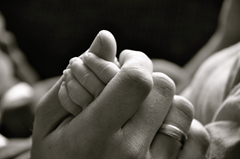Child protection successes ‘must be told’
 Highlighting successes in child protection will help to improve public confidence in the system, a major study suggests.
Highlighting successes in child protection will help to improve public confidence in the system, a major study suggests.
Northern Ireland’s health and social care system needs to find new ways to show the public how social workers are protecting children, according a major review of child protection arrangements. Child protection tends to attract media attention when serious failures take place but a more rounded view of the system would improve public confidence.
‘Translating Learning into Action’ is a review of case management reviews for children in Northern Ireland between 2003 and 2008. Published in January, it was commissioned by the Department of Health, Social Services and Public Safety (DHSSPS) and undertaken by Queen’s University Belfast and the NSPCC.
“Even before they are born,” it notes, “children require parents who will provide for their physical, social and emotional needs, through the expression of love, a sense of security and the provision of care.” The review explains that children “are at most risk from those who are known to them” rather than strangers. Mental illness, drug and alcohol abuse and domestic violence were common in households where children are abused or neglected.
In 2011-2013, 28,496 children in the province were referred to social services. The majority of referred children were never at risk of death or serious injury but 2,127 had to be assigned to child protection plans.
The study’s authors considered 24 case management reviews (representing 45 children at risk). Eighteen of these reviews took place after a child died and the remainder considered serious injuries, neglect and co-ordination between professionals.
Key recommendations from reviews were as follows:
• social services should intervene at an earlier stage before problems become entrenched;
• some families should receive longer term support to make sure that improvements in parenting last;
• vulnerable children should receive therapeutic services to help them deal with the psychological harm from poor parenting;
• professionals should meet more frequently to co-ordinate their assessments;
• senior managers should take greater responsibility for ensuring that staff can manage workloads and have the right expertise for the cases they handle;
• co-ordination between children’s services and services working with their parents should improve; and
• staff should receive regular support and supervision as their work is often highly complex and emotional.
The reviews have resulted in “significant improvements” which have included the development of family support hubs (networks of all the agencies involved in a case), and better sharing of information on potential abusers.
Case management reviews should firstly be seen as “an important window into practice” but they “cannot and should not” be seen as providing the whole or the only view of child protection.
The authors also found that most of the reviewed cases were “very similar” to others known to GPs, health visitors, teachers and social workers. Trying to predict which children are at greater risk of dying or suffering serious injury is “ultimately a futile exercise” but giving more families “early, sustained and co-ordinated support” does reduce the likelihood of harm.
Speaking at the report’s launch, Health Minister Edwin Poots noted that the rate of non-accidental child deaths was continuing to fall. “In my view,” he added, “a strong child protection system has contributed positively to this reduction in numbers, and we owe it to future generations to continue to do what we do well, and to strengthen the system where it transpires we need to.”





